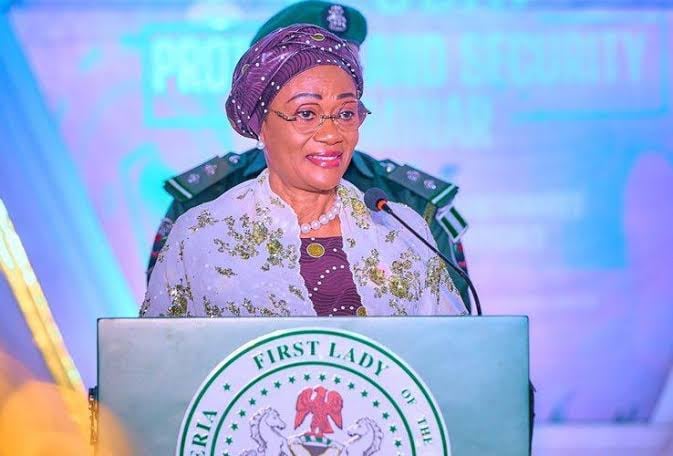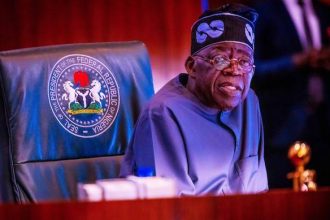The First Lady of Nigeria, Senator Oluremi Tinubu, moved swiftly on Tuesday to dispel rumours linking her 65th birthday fundraising initiative to political manoeuvrings ahead of the 2027 elections. Speaking at an interactive session with State House correspondents at the Aso Rock Villa in Abuja, Mrs Tinubu described the claims as unfounded and reiterated that the fundraiser is strictly for a civic cause.
₦20.4bn Raised in Under One Week
Mrs Tinubu revealed that since the fundraising drive was announced last Thursday, it has attracted ₦20.4 billion in pledges and donations from corporate entities, philanthropic organisations and private donors.
“So far, we have raised ₦20.4bn since this fund launched last week and more are still coming,” she told reporters, while stressing that the funds will be used solely for the library project and handled with accurate accounting and oversight.
Donation Breakdown
Below is a suggested breakdown to illustrate how the ₦20.4bn might be categorised for reporting and transparency. Replace figures with official breakdowns once released:
| Donor Category | Suggested Amount (₦) |
|---|---|
| Corporate Organisations | 12,500,000,000 |
| Philanthropic Foundations | 5,200,000,000 |
| Private Individuals | 2,700,000,000 |
Not Her First Fundraising Initiative
Mrs Tinubu used the occasion to remind Nigerians of previous milestone fundraisers she has led. She said philanthropy tied to personal milestones has been her tradition:
- 45th birthday (2005): ₦50 million raised to complete the National Sickle Cell Foundation Centre.
- 50th birthday (2010): ₦200 million mobilised for the New Era Foundation, focused on youth and community development.
- 65th birthday (2025): Current drive for the National Library complex ₦20.4bn pledged so far.
Why a New National Library Matters
Stakeholders say a modern National Library is essential for preserving national heritage, supporting scholarship, and fostering a reading culture that underpins educational progress.
The National Library complex in Abuja has been an incomplete project for years. Funding shortfalls, contractor disputes and stalled construction left the site in a state many critics have described as emblematic of broader neglect of knowledge infrastructure.
Comparative Table: National Libraries (Illustrative)
This table provides context by comparing the planned Nigerian facility with notable national libraries elsewhere. Update values with final design capacities as they become available.
| Country | Year Built | Seating Capacity (approx.) | Digital Access |
|---|---|---|---|
| Nigeria (planned new complex) | 2025 (planned) | 5,000+ | Yes (planned) |
| South Africa | 2008 | 2,500 | Yes |
| Ghana | 1960 | 1,200 | Limited |
| United Kingdom (British Library) | 1973 | 10,000 | Yes |
| United States (Library of Congress) | 1800 | 15,000+ | Yes |
Expected Social and Economic Benefits
Experts say a completed and well-managed National Library complex could deliver measurable public benefits:
- Strengthened research capacity: Access to international journals and digitised archives will support academic work across Nigerian universities.
- Boost to literacy: Public programmes and reading halls can encourage a culture of reading among youth and adults.
- Employment: Construction, operational staffing, archival experts, library scientists and programme coordinators will be required.
- Cultural preservation: A secure repository for historical documents, publications and audiovisual material.
Transparency, Oversight and Public Accountability
Addressing public concerns over management of funds and the risk of another stalled project, Mrs Tinubu pledged transparent governance for the fundraiser. She said an independent oversight committee comprising professionals, civil society representatives and subject-matter experts will supervise procurement, construction and financial reporting.
Key transparency measures she announced include:
- Public disclosure of donors and amounts (subject to donor consent and privacy considerations).
- Quarterly progress reports posted publicly and verified by independent auditors.
- Open procurement processes with clearly advertised tenders and evaluation criteria.
“This is about leaving a legacy, not politics. The library belongs to Nigeria, not to any party or government,” Mrs Tinubu said, emphasising the national character of the project.
Political Reactions and Public Debate
The fundraising drive has generated both praise and scepticism. Supporters describe the initiative as timely and necessary for Nigeria’s knowledge ecosystem. Critics, however, have raised questions about whether corporate donors might expect political access or favour in return for their contributions.
Neutral analysts note that high-profile philanthropy often attracts political commentary. They stress that the project’s ultimate public value will hinge on rigorous delivery and independent oversight not on the perceived motives of donors.
Expert Voices
Public policy scholars and civil society actors offered mixed but instructive perspectives on the initiative:
Dr. Annabel Nwosu, public policy scholar: “If this project is completed transparently, it could become one of the most impactful contributions to Nigeria’s education sector in decades.”
Ayo Balogun, civil society activist: “We must ensure this is not another elite-driven project that gets abandoned after the cameras leave. Nigerians deserve delivery, not promises.”
Literacy, Access and Long-Term Impact
Nigeria’s adult literacy rate is estimated around the low 60s percent — a figure experts say underscores the urgency of investments in reading infrastructure and public access. A national library with digital services could bridge access gaps for researchers, students and lifelong learners, particularly when coupled with outreach programmes to schools and rural communities.
Risks & Safeguards
Key risks the project must mitigate include:
- Procurement abuses and contract irregularities.
- Construction delays and cost overruns.
- Insufficient operational funding after construction (maintenance and staffing).
Recommended safeguards include binding donor agreements, escrow arrangements, third-party monitoring, and explicit commitments from government agencies to underwrite long-term operational costs where necessary.
What Happens Next?
Mrs Tinubu’s team has indicated the immediate next steps will include formalising the oversight committee, publishing a project timeline and opening transparent accounts for donations. Civil society groups have called for an early public audit of the ₦20.4bn donations and the release of procurement timelines to reassure the public.
“For now, the spotlight is on delivery,” said one policy analyst who asked not to be named. “If the project moves quickly and visibly, it will shift the narrative from suspicion to celebration.”
The ₦20.4bn fundraising milestone announced by First Lady Oluremi Tinubu for the National Library complex has reinvigorated national debate about philanthropy, public infrastructure and accountability. While political interpretations are inevitable where high-profile figures are involved, the central issue remains the project’s potential public value.
If executed transparently and inclusively, the National Library complex could become a lasting legacy for Nigeria supporting research, preserving heritage, and widening access to knowledge for generations to come.












